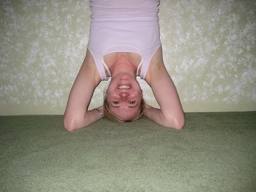What do you know about yoga, and how can it benefit you? A lot of guys don’t think it’s the manliest of activities. If you’re one of them, you’re missing (or misunderstanding) a lot. I treated Donna Davidge to a virtual cup of coffee and asked her to explain how the ancient practice of yoga could revitalize you and your relationships. Donna has been teaching yoga for almost 30 years and is the creator of two DVDs (“The Awakening” and “Flexibility and the Spine”). In addition to managing a full-time teaching practice in New York City, she also does runs retreats in Maine, teaches workshops across the country, and maintains a website, www.sewallhouse.com.
Samantha Feuss—What are some of the biggest challenges men face when they begin to practice yoga?
Donna Davidge—Men have inherently less flexibility, but more strength, so initially they need to take time to work with the flexibility they have and gradually increase it. Men also often approach yoga as a competitive workout, which doesn’t benefit them. If they approach it is a stress reliever and leave out the competition, they’ll have a much better experience and are less likely to get injured. They’ll also be able to make much more long-term progress.
SF—How can yoga benefit your average guy?
DD—It’s a great stress reliever. Yoga can help your mind slow down its busy chatter. Since most illnesses are stress-related, yoga can be a great prevention tool.
SF–You and your husband run a yoga retreat in Maine. What goes on there?

DD—We offer yoga twice a day, meditation and relaxation practices, great healthy food, massage, and sauna. There’s also hiking, kayaking, canoeing, biking, and lots of other outdoors and water sports.
SF—What’s the ratio of male to female clients at your studio?
DD—I would say we have no more than 25% men and that is likely because our retreat is very small and intimate, which may intimidate some men. Most of the men we get are either part of a couple or are comfortable enough with themselves and with being corrected and interacting with a small group.
SF—What are some common myths about yoga and its practitioners?
DD—The myths these days range from it being a religion (it is not), a sex cult (it is not) to being a workout, which it definitely can be. But unless your mind and breath are focused and practiced- it’s not really yoga. So many men feel that yoga is feminine, but while more women practices yoga, there are a lot of male masters and teachers.
SF—As a former competitive athlete, I can tell you that yoga has been one of the hardest things I have done. It has taken me years to learn and grow—and especially to let go of the idea that I had to compete with others in the room. My husband can always tell when I miss my classes- and I think everyone else can too! Yoga makes my body as well as my mind more flexible. I’m nicer afterward, and much less stressed.
DD—That’s exactly what I mean. You need to learn to look only at yourself, and not everyone else. It is mental, spiritual, and emotional strength all in one. For so many men, with all the responsibility they have at home, at the office, and in their lives, yoga can really be wonderful.
SF—Can you explain the different types of yoga?
DD—There are many types of yoga out there these days. Hatha means the physical branch of yoga- balancing moon and sun or female and female- it means also learning to live in the present. Within those branches there is Iyengar, which is alignment based; Ashtanga, which is very rigorous and has six specific series; Bikram (or hot yoga) which consists of 26 poses.
SF—What do you specialize in?
DD—The one I’ve taught the longest is Sivananda. Kundalini, which is based on breath, mantra (sound), hand positions, and movements or static holds. It works a lot with the idea of chakras, or energy centers, along the spine. It was brought to the United States in 1969 by Yogi Bhajan, an Indian Sikh. But I also teach Hatha-based practices which incorporate my studies in Ashtanga, Iyengar, and Dharmayoga (another one!). I find that having such an eclectic background helps me better meet the varied needs of my students.
SF—Yoga can be done with partners, as well as individually. Do you find that couples that practice together have stronger relationships?
DD—Relationships are so challenging- there is so much to learn from them. While it’s not a cure all, the intimacy that comes from yoga can help a relationship become more solid and can improve communication. You’ll feel better emotionally, feel more clear-headed, and get the blood flowing- that can’t hurt. It can help couples connect in a healthy way.
SF—I know you practice with your husband. Has it benefited your marriage?
DD—My husband has taken classes with me a lot over the years and we sometimes practice together. It’s great to have that common interest, lifestyle and language.




Comments are closed.